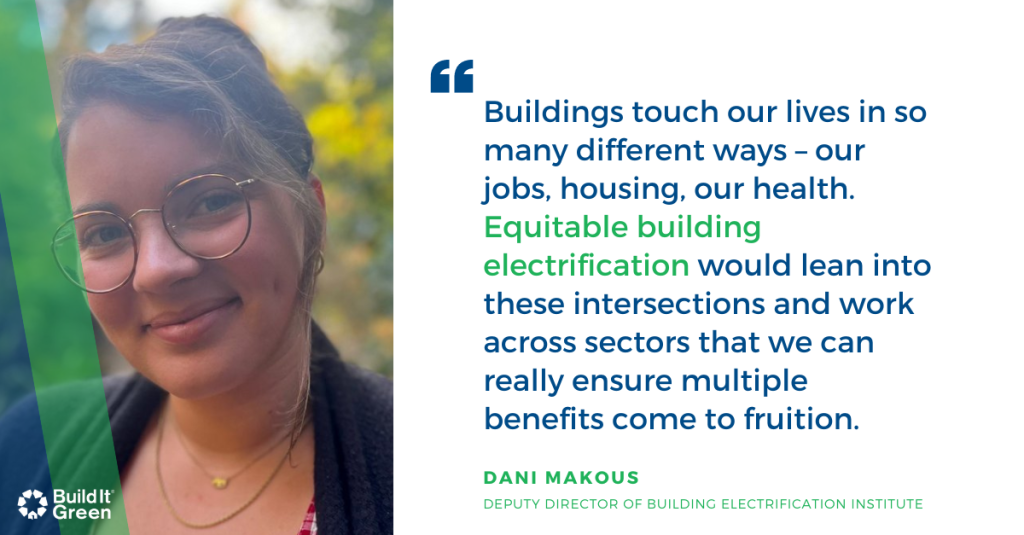© builditgreen.org 2024 | All Rights Reserved | Site by JoomDev
Homes are where we live, work, play, and sink down our roots. Homes also play a key role in meeting California’s carbon neutrality goal by 2050.
However, new research from SPUR shows we are not on track to meet our climate target in the residential buildings sector.
As increased attention falls on transitioning our homes to be more climate friendly, it is essential to center communities and understand the intersectional aspects of our work to ensure an effective, equitable transition. So, how are other cities, states, and organizations making headway to decarbonize homes equitably for their communities to thrive?

“Buildings touch our lives in so many different ways – our jobs, housing, our health,” said Dani Makous, Deputy Director of Building Electrification Institute (BEI). “Equitable building electrification would lean into these intersections and work across sectors that we can really ensure multiple benefits come to fruition.”
There are proven opportunities, lessons learned, and local stories to decarbonize our homes equitably, lift everyone, and deliver multiple benefits. Thanks to our speakers for sharing these three stories:
These on-the-ground stories showcase the interwoven ways organizations and communities are working towards equitable housing decarbonization.
While there are state and federal resources available to support home electrification, large funding gaps still remain, so local funding sources can be the critical connective tissue to support an equitable transition.
In Denver, voters enacted a 0.25% sales tax in 2020 that generates $40 to 50 million in annual revenue towards a Denver Climate Protection Fund, half of which is targeted to under-resourced communities and populations that are most impacted by climate change. Importantly, the fund provided incentives and technical assistance for a building performance standard and electrification ordinance that came into effect in 2021.
This supplemental local funding lessens the burden on landlords who may not have the means, time, capacity, or technical expertise to comply with the ordinance. Local funding can also resolve health and safety problems (e.g. asbestos removal or roof replacement), and ensure landlords and property owners include tenant protections and fair labor standards in their housing and contract agreements, all of which is critical to ensure the building decarbonization transition achieves equitable outcomes
The Bay Area High Road Training Partnership (HRTP) is “striving to achieve rapid and equitable decarbonization with no tragic tradeoffs” in job quality and the workforce.
HRTP aims to shift jobs away from poor wages with limited to no benefits and little training towards fair labor standards that lead to quality, long-term career jobs for the entire workforce. They do not want history to repeat itself, such as the solar boom where people were trained to do solar installations, but found little work once the solar demand declined.
Speaker Chiara Arellano from Rising Sun Center for Opportunity references wisdom from her former boss: “High quality jobs without access is exclusion. High access jobs without quality is exploitation.”
Reflective and intentional efforts are already underway to ensure that communities thrive – and can make use of what we’re seeing and learning in other places – on their journey to ensure a climate stable future.
These interconnected efforts are essential to transition our homes into the clean energy future we want and need.
Check out our event recording for more information about these case studies and to gain a better understanding on the range of factors and relationships important to ensuring our communities are centered in housing decarbonization efforts.
To engage with BIG’s initiative POWER group, contact [email protected]. View the event presentation slides below:
Build It Green connects changemakers to transform the housing system in service of human and ecological vitality.
1 (510) 590-3360
Mon – Fri, 9am-5pm
[email protected]
© builditgreen.org 2024 | All Rights Reserved | Site by JoomDev